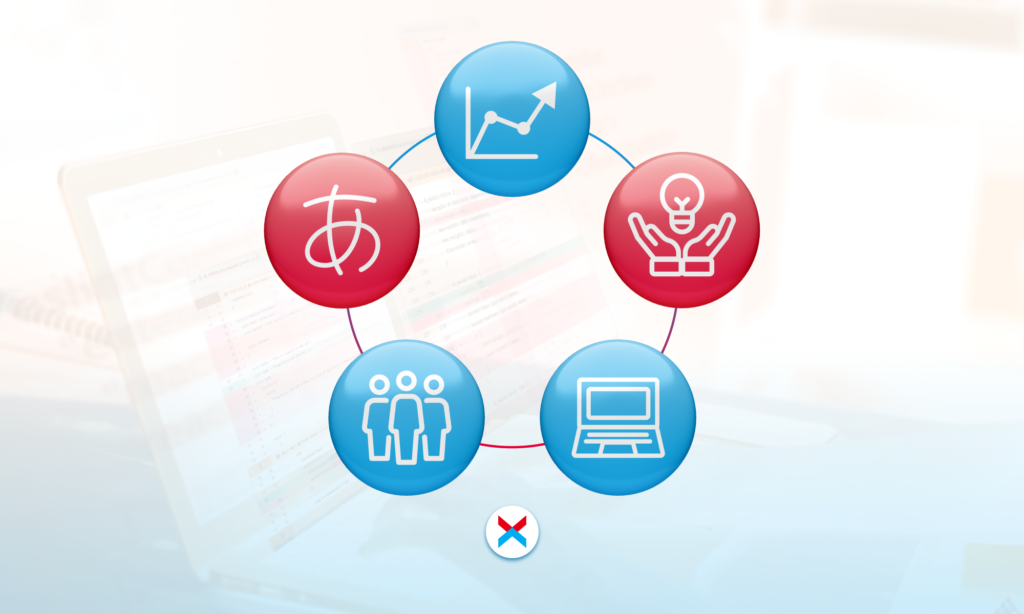If you’re here, you’re probably wondering about what skills to put on your resume? Now more than ever, the competition is huge, and it’s difficult to stand out, especially at the beginning of your career.
You might have the necessary skills, but if you cannot showcase them, you are doomed…
That’s why we decided to share our tips in this article about the top skills for resume and the best ways to organize them. As an international IT outsourcing company, our HR department specializes in hiring the best talent, and now you’ll learn some of our secrets.
Remember: the recruiter should see with one glance whether to swipe right or left on your profile.
Your job is to make sure you put your best foot forward, so it will be an easy decision to move you into the next round!
And now, onto our first tips about which skills to put on your resume!
What are the Best Job Skills to Put on a Resume?
The answer should be simple: the most relevant ones to the job are the skills for a resume. But what if you are fresh out of university and only have real work experience in student jobs?
In this case, always put more emphasis on your existing knowledge, for example, classes and courses you did, specific technology you know how to use, etc.
Also, focus always on the transferable skills. This is also true for switching careers or specializations and also if you are at the beginning of your career.
Let’s see an example. Imagine that you are a recruiter hiring for a job that needs organizational skills and good interpersonal skills. You have two candidates. Which one would you prefer to have an interview with?
Candidate A
“I worked at a café.”
Candidate B
“I managed various tasks at a café,
- including organizing 50 deliveries/week,
- successfully cooperated with 10 colleagues of various backgrounds,
- and served 100 customers daily.”
See what I did here? When deciding what skills to put on resume, it is important to use the ones that can be supported by numbers and results and that can also be used in the new position.
Hard Skills vs Soft Skills in a Resume
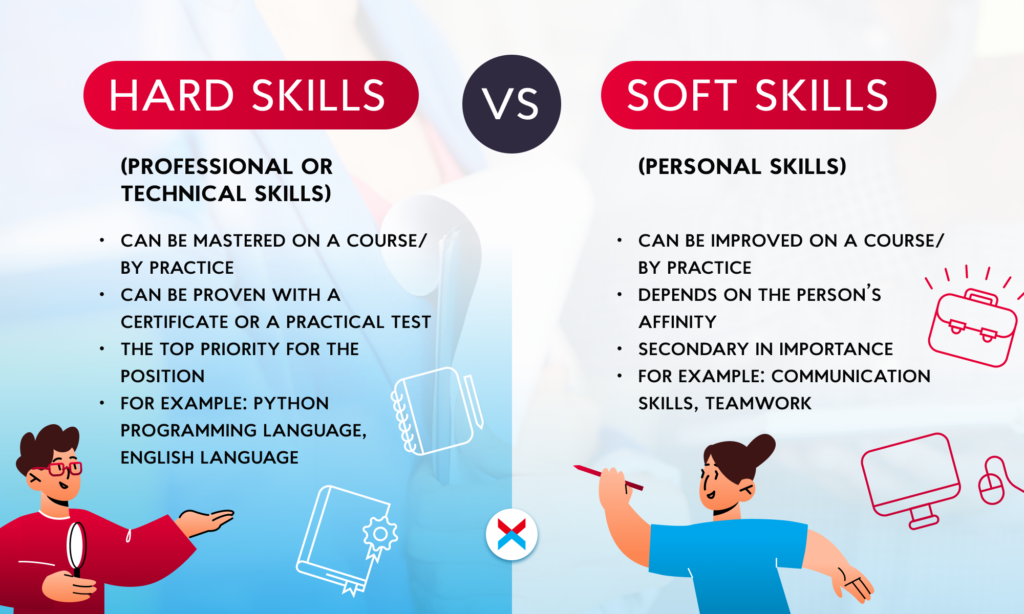
What Are Hard Skills?
In other words: professional skills or technical skills.
Hard skills are the specific abilities you need to complete the tasks at your new job.
In general:
- They can be mastered on a course/by practice
- They are easier to prove (with a certificate or by doing a practical test)
- And usually, they are the top priority to possess
For example, for a Medior Python Data Engineer position, the hard skills to include on a resume are:
- Strong programming skills in Python
- Skills in using relational databases (PostgreSQL, MSSQL or MySQL)
- Skills in working with cloud platforms (GCP, AWS, Azure)
Usually, the required skills are listed at the top of the job description. All you need to do is to add any and all hard skills for resume that are mentioned, and you have.
What Are Soft Skills?
In other words: personal skills.
Soft skills are a bit trickier. Although, they can be improved with time, usually, we possess them thanks to our personality, upbringing, or even our culture.
In general:
- They can be improved by doing a course or practice, but it also depends on your affinity
- They are difficult to prove
- They are “good to have”
For example, for the same position, the soft skills to put on a resume can be:
- Being a team player
- Having excellent collaboration skills
- Strong communication skills
Try to choose soft skills based on the requirements, but also what you can talk about and defend in an interview.
The Best Hard Skills for Resume (Examples)
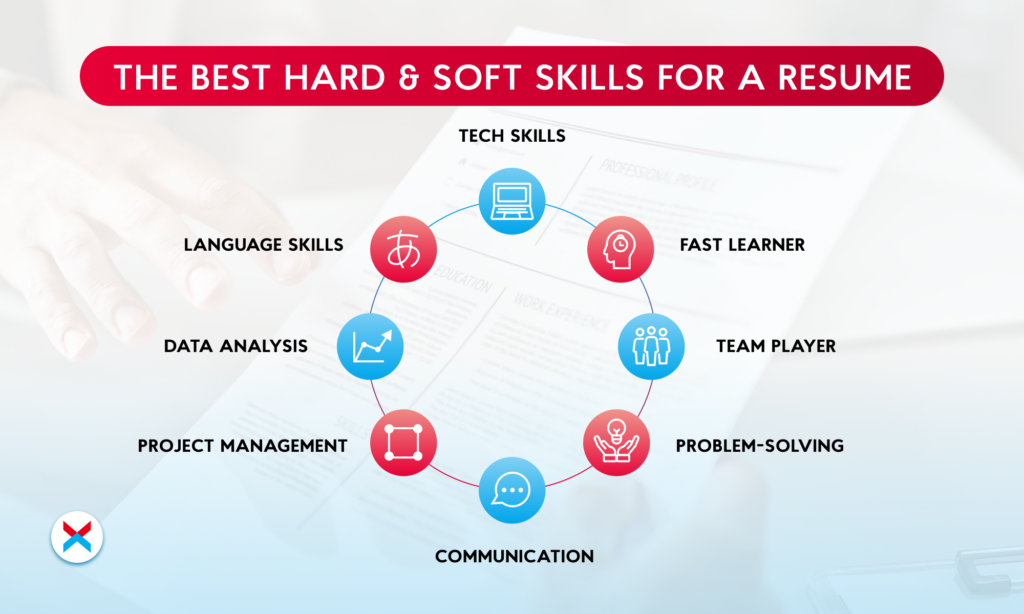
Good skills for resume are the ones you can prove either with a certificate or experience (job experience or otherwise).
Let’s say that you apply for a Junior Developer position. You have a university degree in Mechatronics Engineering, but you’ve developed websites for a project. Now, you have the necessary skills and can explain how you know what you know.
Since NIX is an IT outsourcing company, this article focuses on IT positions and what to include in an IT resume. Most of the hard skills are “digital skills” on this list.
Tech Skills (more on this later!)
- Programming languages
- Cloud computing
- Data skills
Language Skills
English and other languages are must-have skills to include on a resume.
Data Analysis Skills
Being able to understand and visualize data are always good skills to put on a resume.
Project Management Skills
Even if you are not a project manager, managing tasks and organizing your work life are among the best skills to put on a resume. And these are skills that can be learned, for example, how to use PM tools.
Negotiation and Presentation Skills
Even as an IT specialist, you might need to present ideas to a client or explain the project status in a meeting. These are definitely good skills for a resume and can also be mastered.
Do you wanna check how many key skills for a resume you have? Go to our vacancies and read some of the job descriptions! You can even apply if you meet the requirements…
The Best Soft Skills for Resume (Examples)
Important: just because everyone looks at your hard skills first doesn’t mean adding soft skills for a resume is useless. It can happen that two candidates with the same level of technical skills compete, and the soft skills decide the race.
While hard skills prove that you are a specialist in the area, soft skills show how versatile you are. So, the best skills to put on a resume are the ones that can fit into many situations.
Also, be careful not to use synonyms! Your CV has limited space, so once you cover “team player,” don’t go on to talk about “teamwork,” “collaboration,” etc. You should avoid using terms that are too broad (“interpersonal skills” can mean many things).
Communication Skills/Writing Skills/Public Speaking Skills
No matter what position you apply for, communication skills are always the most important skills to add to a resume! Depending on the position, you can also show your specific skills (such as copywriting or presentation skills, but those can also fit into the hard skills category).
Problem-Solving Skills
Whether it’s a real problem or just a new type of task, you need to handle it like a pro.
Team Player/Teamwork Skills/Collaboration Skills
You will join a team 99% of the time. You have to emphasize that you know how to cooperate with fellow team members and that your transition will go smoothly.
Fast Learner/Quick to Acquire New Skills
Catching up to speed and being productive are crucial skills for a resume.
Can Work Independently/Initiative Mindset
Besides the initial training, they would want you to solve tasks with minimal supervision and assistance. Being efficient and reliable are key skills for a resume.
Punctual/Follow Deadlines/Time Management Skills
Everyone likes a dependable colleague. That’s why these are good skills to put on a resume.
Attention to Details
Nobody wants to correct mistakes after a colleague. Paying attention and following the instructions are valuable skills for a resume.
Flexibility/Can Work Under Pressure
Tight deadlines, difficult clients, or other hardships can happen at every workplace. Show them that you know how to handle such situations.
Empathy/Humor
In the modern workplace, a lot of companies put emphasis on a good atmosphere. These unique skills for resume can show that you are a human, who will fit right into the team, and will follow the values of the company.
Critical Thinking Skills
This last soft skill refers to the ability to see the big picture and ask the right questions. Especially for tasks that require creative solutions, it is important to not just blindly follow orders but to come up with your own, out-of-the-box ideas.
How to List Skills in a Resume or CV
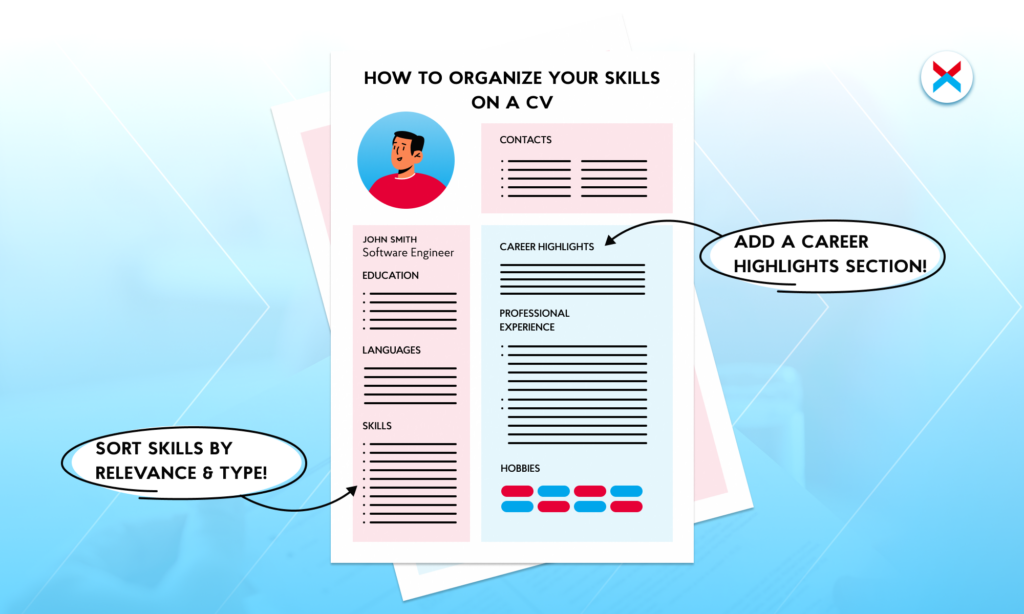
1. Sort Skills by Relevance
Usually, CVs are organized chronologically, but when it comes to skills, you can also add a “skills cloud” on most templates. It is important that the first 3-5 skills to put on a resume are the most relevant for the position (tools, technologies, programming languages, etc.).
2. Add a Career Highlights Section
If your most important skills and experiences are not at the top of the chronological list, it is practical to add a career highlights section. It’s placed at the top of your CV, and it’s the #1 spot to showcase the best skills to put on a resume.
3. Categorize Resume Skills by Type
To make the reader’s life easier, the skills to put on a resume can be grouped by their category. For example, the languages you speak, the hard skills you have, etc.
Top 10 Resume Hard Skills Examples for IT Jobs
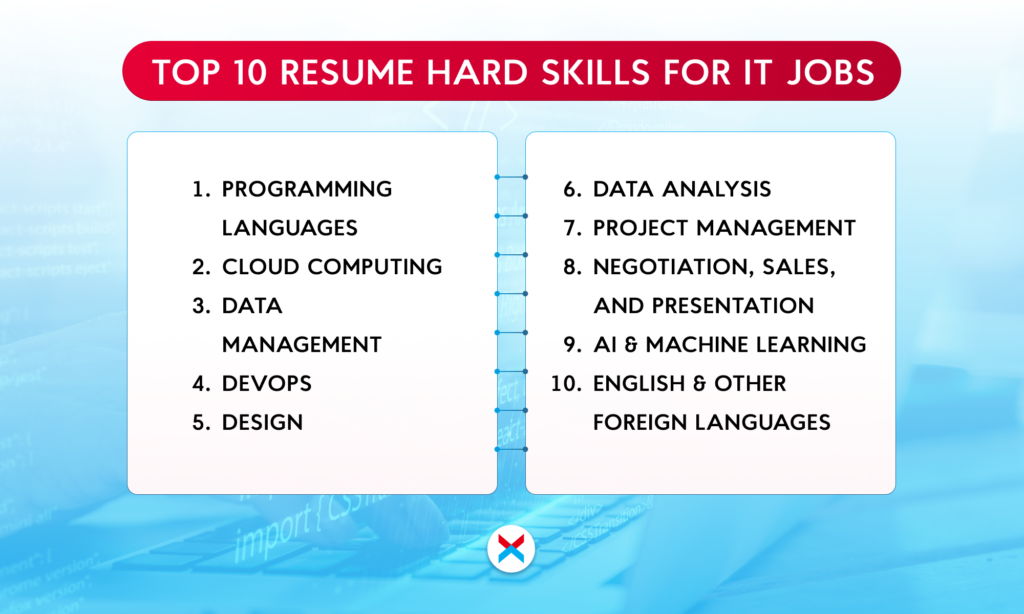
These are the skills to add to resume if you plan to apply for IT jobs – for example, at NIX.
Below, we list the most commonly required hard skills to include on your resume if you’d like to apply for developer, engineer, BA, or PM positions.
- Programming languages (Python, .NET, Java, JavaScript)
- Cloud computing skills and tools (Azure, GCP, AWS)
- Data management skills and tools (databases, data lakes, data warehousing)
- DevOps skills and tools (CI/CD tools, Docker)
- Design skills and tools (UX/UI, graphic design, Figma)
- Data analysis skills and tools (Power BI, Tableau)
- Project management skills and tools (Jira, Confluence)
- Negotiation, sales, and presentation skills (for cooperating with clients)
- AI & Machine Learning skills and tools
- Language: upper-intermediate or higher level of English. This is a key skill for a resume, no matter what job you apply for!
Top 10 Soft Skills for a Resume for IT Jobs
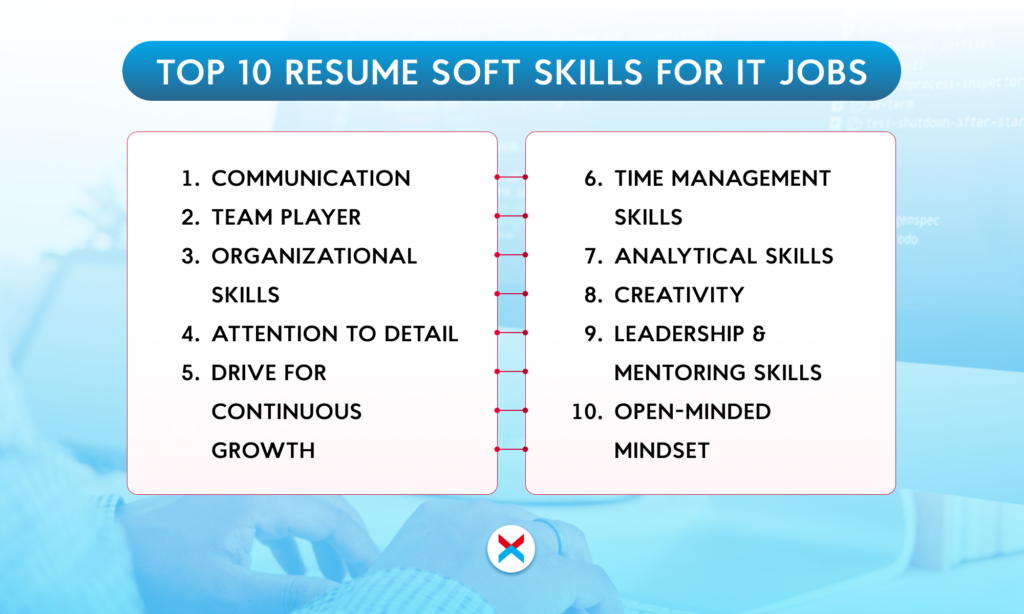
Among the good skills to put on a resume, there are some top ones you should definitely not miss if you plan to apply for IT positions.
- Communication skills
- Team player with excellent collaboration skills
- Management and organizational skills
- Attention to detail and accuracy
- Passion for continuous learning and improvement
- Ability to manage timelines and deadlines
- Analytical skills
- Creativity
- Leadership and mentoring skills
- Open-minded mindset, can work in a multinational environment
We created this list of the best soft skills for resume based on the jobs we offer at NIX. If you plan on applying for positions in other industries (marketing manager, payroll specialist, etc.) then you’d need a different skillset.
We hope that this article helped you understand more which skills to put on your resume. Of course, these tips don’t apply to every situation, you also need to experiment a bit.
And last but not least, remember that it’s a numbers game. Don’t give up! You will find your dream position, maybe at NIX…
Check out our vacancies and apply today!
Summary
The Number of Skills to Include in a Resume
Your CV has limited space, so a maximum of 10 should cover it. Also, your work and education history already cover most of your hard skills, so you should focus on adding the soft and language skills.
The Best Skills for a Resume
The ones that:
- are relevant for the position
- are transferable skills
- can be proven with a certificate or job experience
- can be supported by numbers and results
- show your expertise and versatility
- make you stand out
The Importance of Putting Soft Skills vs Hard Skills on a Resume
They are both important. However, hard skills are usually the priority for recruiters, so you should focus more on them. Check the job descriptions at NIX to get a better idea of what is expected of you!
